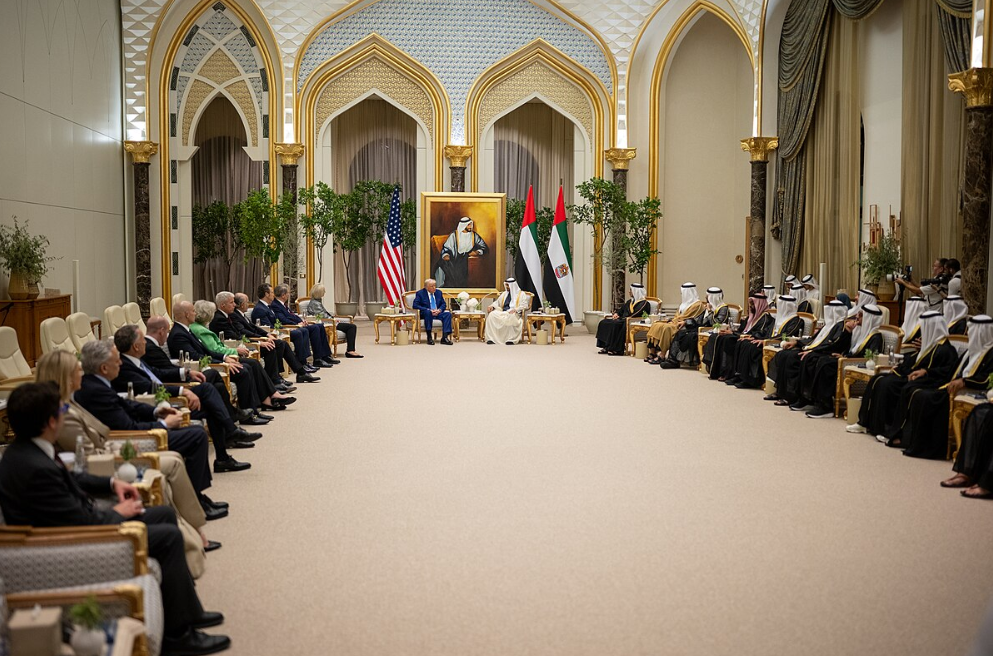A New Era of AI Strategy in the Gulf

By: Ramsey Zeidan / Arab America Contributing Writer
In the new age of Artificial Intelligence, governments are forced to invest in AI or risk falling behind. AI capabilities now mean geopolitical power, and few countries understand this better than the Gulf States. In a controversial visit to the Middle East last month, President Donald Trump struck business deals with the United Arab Emirates, Saudi Arabia, and Qatar to create a two-way AI strategy. This strategy puts AI at the forefront of post-oil technological development, and includes the building of massive data centers, cloud sovereignty, and the importing of millions of NVIDIA chips. The United States stands to benefit by outsourcing the strain of AI on U.S. power grids, and the Arab world is looking to capitalize on a booming tourism industry coupled with AI to create “futuristic” tourist hubs.
Another facet of this strategy is the laissez-faire approach to the diffusion of chip technology. Much to the dismay of Elon Musk, OpenAI CEO Sam Altman and other tech leaders have adopted the role of de facto diplomats, steered narratives, and brokering crucial infrastructure deals. Relinquishing a large degree of economic power is uncharted territory for Washington, but its implications are yet to be seen. What we do know, however, is the scale and scope of these business deals.
AI, Diffusion, and Deals
Though more details are set to be disclosed later, there are still important takeaways to gather from information currently available. In Riyadh, Saudi Arabia unveiled the government-backed AI startup Humain, which has already been promised thousands of advanced NVIDIA chips. This comes in tandem with a groundbreaking deal between Humain and AMD (Advanced Micro Devices) to secure a $10 billion infrastructure partnership. Furthermore, Amazon Web Services committed upwards of $5 billion to build a dedicated “AI Zone” in Saudi Arabia. Beyond Saudi Arabia, other Gulf States are following suit. Regional powerhouse G42, an Emirati tech firm based in Abu Dhabi, has reportedly been cut into a larger NVIDIA chip deal. G42 is set to obtain 100,000 AI chips by the end of this year, which will be utilized to update cloud server infrastructure and data centers in Abu Dhabi.

Geopolitics and the Future
On paper, billions of dollars of U.S. technology seem like a promising venture. Unfortunately, as mentioned earlier, these deals come with geopolitical strings attached. The absence of reliable security mechanisms to protect American technology means that it could inadvertently slip into the hands of America’s competitors. Moreover, the Middle East needs to avoid overreliance on a solely American AI ecosystem. The Trump administration’s approach to AI foreign policy is almost the exact opposite as Biden-era guidelines; a future administration could easily reverse the lax trading policies of today. Ultimately, the Gulf States currently run the risk of becoming a pawn in the race for dominance between America and China. They must use the tech capital from recent deals to establish some form of independence from global supply chains.
The future of AI and chip technology in the Gulf is unclear, but one thing is for certain: the Middle East can become a centerpiece of the global AI race. Chinese and American tech firms are vying for dominance, as the winner of the AI race will enjoy economic, scientific, and possibly military power. The Gulf States are involved with key Chinese players like Huawei, while also working with American firms like Qualcomm. Simply put, the Middle East is a battleground by proxy, as global superpowers fight for the favor of the Gulf. Though there are rumors of Arab tech firms like G42 divesting from China, it is in their best interest to stay neutral, entertaining both Beijing and Washington. With promising plans for the future and a balancing act at play, Arab tech firms have a long road ahead to find their role in the global AI race.
Want more articles like this? Sign up for our e-newsletter!
Check our blog here!








